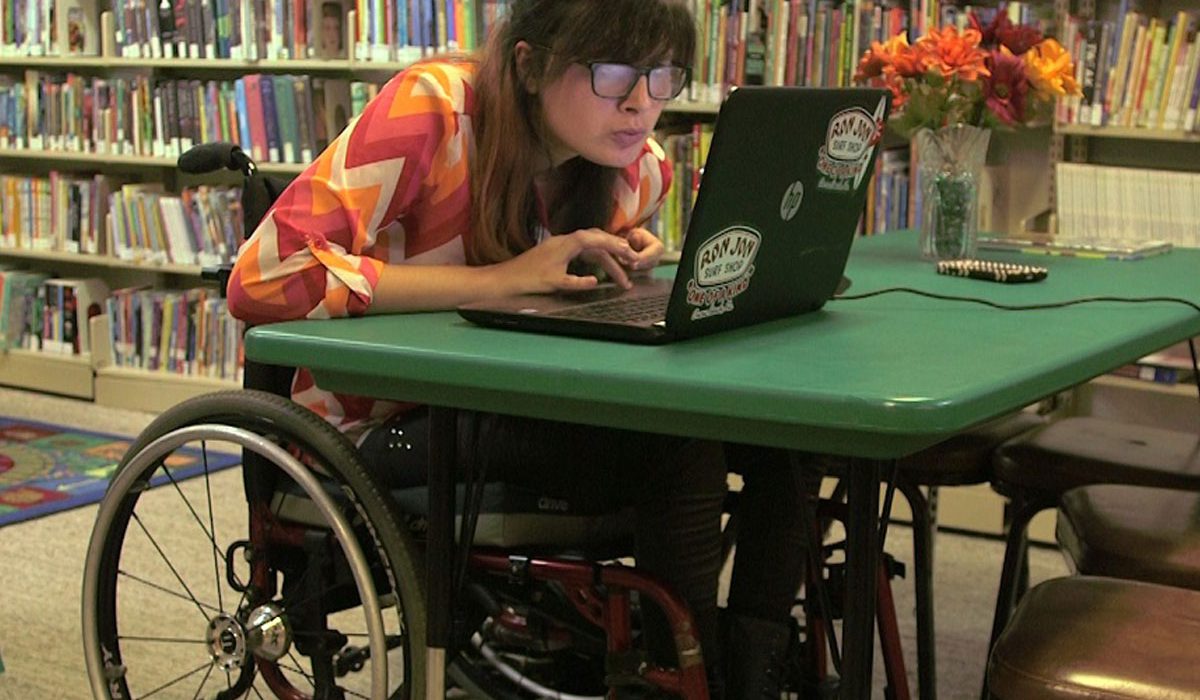Choctaw Nation release
DURANT – Finding success stories in the Choctaw Nation’s ConnectHome program is as easy as the click of a mouse.

News presented by First United Bank.
In July 2015, President Obama chose Durant High School to launch the initiative aimed at placing computers in the hands and homes of Choctaw students throughout southeastern Oklahoma. The area is one of five “Promise Zones” across the country, among the nation’s most rural and under–served areas. The task of delivering the services of ConnectHome went to Choctaw Nation Housing Authority. Fred Logan of the Hugo office was selected to head up the program. As manager of the new program unveiled by the president of the United States, Logan got busy.
The list of stakeholders in the Choctaw Nation program is impressive:
· ABC Mouse.com, whose mission is “to help every child build a strong foundation for success in school and beyond.”
· A host of Internet Service Providers including, Verizon, PINE Communications, VYVE, AT&T, Comcast, Cox Communications and Cherokee Communications.
· American Library Association, which brings collaboration with local libraries to facilitate broadband adoption, digital literacy skills and access to resources for education and workforce development for public housing families.
· GitHub, a software builder that donated 133 Azpen Tablets for Choctaw Nation Housing Authority’s children living in affordable rental sites.
· College Board in partnership with the Khan Academy, offering students living in HUD housing in ConnectHome communities free, online SAT practice resources and access to college planning services, such as BigFuture.
· Boys & Girls Clubs of America, which is committed to making its Digital Youth Development and My Future Essentials programs available to youth in public housing and near local club sites.
Community meetings were met with standing-room-only turnouts from Hugo to Poteau. Representatives of companies and agencies from Washington, D.C. to San Francisco attended and pledged assistance.
In less than a year, the Choctaw Nation partnered with Best Buy and brought the Geek Squad Academy to Durant where more than 150 Choctaw students ages 10-18 attended the two-day opportunity to hone their computer skills. The Choctaw Nation was the first to host such an academy in Oklahoma. Geek Squad instructors from Best Buy stores in Oklahoma and Texas were joined by employees from Durant Independent School District who volunteered at the academy. The seven classes of the academy went beyond the basics, ranging from Lego Robotics to Circuits and 3D Design.
“Each year, the ConnectHome team conducts around 20 group trainings on Digital Literacy,” Logan said.
Coming to light at a meeting held at the Choctaw Nation Community Center in Talihina was the town’s lack of infrastructure to receive internet service. Several people noted that to get connected in town meant either bring your laptop to a local business lobby or buy a Wi-Fi card. Outside the city limits, in LeFlore County were even fewer options.
Clearly the challenges are many, but for one young Choctaw not being wired is hardly the biggest hurdle she has faced in her 21 years. Talihina-resident Raven Stark is on her way to becoming a public speaker.
“I want to let others know they should follow their dreams,” Stark said. “Don’t give up on what you believe in.”
Thanks to ConnectHome, Stark is using a new HP laptop, has received training to put her speeches on social media including her own Facebook page, and, maybe as important as the hardware and software, she said, “I’ve gained confidence.”
Confidence in herself and her abilities is not something that has always been there. Since she was 5 years old. Stark has lived with a rare medical condition, Friedreich’s Ataxia. The inherited disease causes progressive damage to the nervous system manifesting in symptoms of poor coordination and can lead to scoliosis, heart disease and diabetes. It does not, however, affect cognitive function. It occurs in about one in 50,000 people. Interestingly, Stark’s twin brother does not have it, or any other health difficulty.
“My eye-sight is shaky. I wear glasses. Sometimes I see more. I’m also color blind. It’s my eyes and hearing. I have severe hearing loss. But, I’m doing good,” Stark said.
Some students at one high school she attended had not been kind to her. She fared better in Talihina, where she graduated. In her three years that followed at Kiamichi Technology Center she grew even more. She focused on business and became a member of the Business Professionals of America. The club encouraged her to enter its speaking competitions. Eventual wins locally, at state and the regional level meant one thing. “I went to Nationals,” she said.
In Boston, she swept the Nationals in Contemporary and Extemporaneous Issues with honors in speaking, presentation and for her graphic designs. Her topics were what she knew best at that age – her experiences and challenges.
Stark seemed to be making a lot of progress with few resources. Those achievements gained the attention of the people at ConnectHome.
“ConnectHome reached out to me in September and I jumped at the opportunity,” Stark said.
Now she’s speaking out, not for class credit, but to help others.
“I’ve spoken at Kiamichi Technology Center and at church, War Cry Ministry,” she said. “Those speeches are online at ‘Raven Speaks.’”
Choctaw Nation’s Video Productions Department is preparing a video about her story. Meanwhile, she is working on additional speeches to give.
“I want to inspire others, especially those with disabilities and elders,” Stark said. “I want to leave the house more and go out and discuss things. I believe in myself now and that I can do more with other people.”
Not all stories are as dramatic as Raven Stark’s. But ConnectHome is improving lives and situations.
By last year’s fourth quarterly report, ConnectHome shows among 380 units (32 vacant) of affordable housing and elder housing contacted, 203 were connected with computers and internet service. The number of K-12 children in those units that were affected: 103.
Logan said, “In Talihina’s 60-unit Belvin Housing Addition, 83 percent are signed up and at the Independent Elder site there are 22 Elders connected.”
Monthly cost in some areas for 50 gigabytes is minimal, Logan said. We offer, by way of Internet Service Providers three internet plans for applicants. The only qualification is that they must be signed up on SNAP or receive Choctaw commodities.
“Connectivity and digital literacy lead to success,” Logan said.
ConnectHome is putting families without internet resources within reach of better education, job opportunities, SAT test training and college preparation for enrollment.
This has been accomplished with a staff of two under Logan’s guidance: Sherra Taber, ConnectHome Training Coordinator and Olen Cox, IT Project Coordinator.
To learn more about Choctaw Nation’s ConnectHome program visit its Facebook page online; phone 580-326-7521 Extensions 6352, 6342 and 6330; or contact the ConnectHome office at Housing Authority of the Choctaw Nation of Oklahoma, ConnectHome Program, 207 Jim Monroe Road, Hugo, OK 74743.


